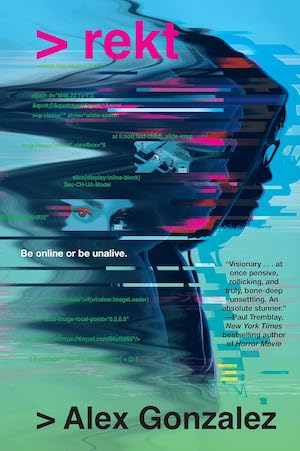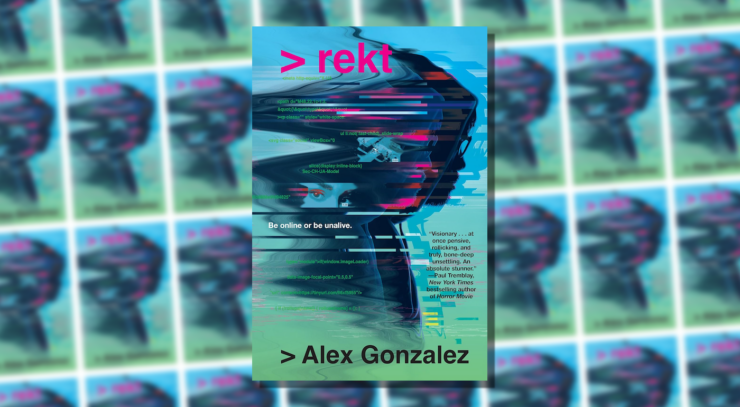It’s relatively safe to say that Alex Gonzalez’s rekt is a horror novel, but what kind of horror novel is it? Horror is, after all, a genre that overlaps with plenty of other genres; depending on its contents, a horror narrative could be filed as crime fiction, fantasy, or science fiction. Gonzalez’s novel, about a young man who becomes obsessed with a mysterious online archive of deaths on film, keeps its true nature ambiguous until the very end. This could be a very grounded story about trauma begetting trauma or a paranoid thriller about a sinister conspiracy; it could also be a novel about the slow breakdown of reality—or the lack of a consensus reality at all.
Writing about J.G. Ballard in 1970, The Guardian’s Michael McNay had this to say:
Ballard has concluded that fictional violence seen on the television and cinema screens every night is a way more real than real violence; people experience it imaginatively whereas real events are part of the grey media background.
McNay was discussing Ballard’s then-recent collection The Atrocity Exhibition, a title that would work nearly as well for Gonzalez’s book more than half a century later. (Invoking Ballard isn’t as random as it seems; there’s a mention of Harlan Ellison early on in rekt, so it’s fair to say that Gonzalez knows his genre history.) Gonzalez’s novel is also about that same disparity between onscreen violence and real violence—but in a world where technology has permanently muddled the line between the two.
rekt begins with its narrator, Sammy Dominguez, at the age of 10, when he witnessed his first death online through a video of one man cutting another man’s throat. A second flashback to Sammy’s childhood, this one a year later, shows a more abstract series of images that won’t be explained until later in the novel; from there, Gonzalez jumps ahead 15 years, to a point where Sammy is in Georgia on a mission of vengeance. How did we get from one point to the next? It’s with the next chapter that things take on a more linear progression.
Here, Sammy is 21; Ellery, his girlfriend since the two of them were in high school, has just died in a car accident. He is, understandably, devastated; as he reckons with his grief, he revisits some old haunts of his, including an online forum where he used to share scary stories about an entity called the Wax Man. While there, someone else using the username Haruspx recommends that he download a dark web browser and make his way to a forum there at the address chinsky.rekt.x. Sammy does so and finds footage of the accident that killed Ellery; he is both shocked and can’t look away. And so an obsession—“addiction” might be a better word—is born.
Buy the Book


rekt
Finding video of a loved one’s death online is unnerving enough, but on a subsequent visit Sammy encounters something even stranger: an array of videos of Ellery dying, each in a different way. “She gets beheaded. Torched. Lynched. Drawn and quartered,” Gonzalez writes; Sammy also finds one video of an 80-year-old Ellery dying in a hospital bed. Eventually, Sammy discovers that these potential death videos are available for more people as well—some of whom are still among the living. A gold ring denotes deaths that have taken place in reality; Sammy only becomes more obsessed at this point, and begins using the videos to lash out at the people around him as his life gradually bottoms out.
There’s a point here where Sammy seems very close to becoming the villain of his own story. Eventually, he links up with Izzy and Jay, two people who are working against chinsky and have a greater awareness of how it works. Here’s how Izzy explains the inner workings of chinsky:
“So, people are designing these little bots that surf online for two things: violent videos and personal data. Then it tries to match your data with some snuff vid they’re synthesizing. It’s all numbers. Zeroes and ones”
Throw in the element of a betting marketplace where players wager on how likely a given synthesized video is to come true and you have an added layer of creepiness present. But even as Izzy and Jay lay some groundwork for what’s happening, Gonzalez hints that there’s more to it than that. Their own convictions involve some level of speculation, in addition to the facts that they can verify. This unholy blend of deepfakes, snuff films, and online gambling is sinister enough—but there’s another aspect to rekt that (to this reader, anyway) feels subtly hinted at. In reading this story of characters being manipulated and surveilled by semi-omnipotent forces, simulation theory (or some variation of it) feels like a plausible explanation for all that’s taking place.
At a few months, rekt hints at the malleability of reality, as when Sammy, Izzy, and Jay interrogate a man with deeper knowledge of this online community:
He had been so deep in chinsky and the inner workings of it all, he was certain, just as Izzy and Jay were, evidently, that all of us were being watched at that very moment. He called it being generated. Called the videos generations.
It’s also notable that, in one action scene when Sammy, Izzy, and Jay take on an armed group looking to kill them, Jay uses video game language to describe one of their assailants, a man who’s had significant plastic surgery. “His whole face is modded,” Jay tells his friends. “Why is his whole face modded?”
Just as rekt has fallen into a relatively familiar rhythm, with a trio of antiheroes taking the fight to the powerful people who have ruined their lives, Gonzalez pivots again, pushing the narrative into a very different structural place. This narrative fragmentation, taking place at the novel’s end, also feels like an echo of the notion that the novel may be set in a simulation.
In a series of found texts from various online spaces, Gonzalez hints that one major character may have effectively transmigrated into the internet itself. It’s as disquieting for its implications as it is for its lack of explanation; reading it, I kept waiting for someone to step in and make some sort of declaration of reality. No such declaration ever came.
If that is where Gonzalez is going with this—and it’s a big “if”—it makes a surprising amount of sense. In theory, cosmic horror and the idea that we’re all living in a simulation seem miles apart. In practice, they fit together shockingly well. (Spoilers for Hervé Le Tellier’s The Anomaly follow.) In Hervé Le Tellier’s novel The Anomaly, scientists and governmental authorities are perplexed when an exact duplicate of a commercial flight, along with everyone on board, pops into existence. The novel’s climax strongly hints that this is because the world that these characters inhabit is, in fact, a simulation, and they’re being tested by whatever beings are operating that simulation to see if they should continue to exist. Higher beings that don’t care about the continuing existence of life with the power to eradicate everything? Sounds like the stuff of 180-proof cosmic horror to me.
I can say with some certainty that rekt is reminiscent of two works above all else. Thematically and narratively, it sits neatly beside James Tynion IV and Fernando Blanco’s comic book W0rldtr33, an ongoing series about a bizarre presence lurking on the fringes of the internet with the power to destroy civilization. Gonzalez’s novel also recalls Brian Evenson’s novel The Open Curtain in how a largely linear narrative completely breaks down by book’s end. Ultimately, there’s a lot at play here, from the toxic tendencies of some circa-now online communities to more timeless concerns about horror and reality. rekt never quite gives you what you’d expect, and it’s all the more unsettling for it.
rekt is published by Erewhon Books.










